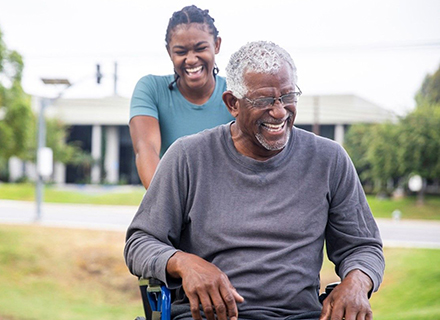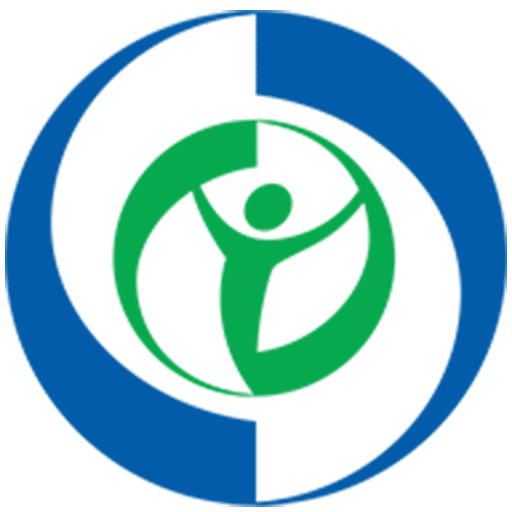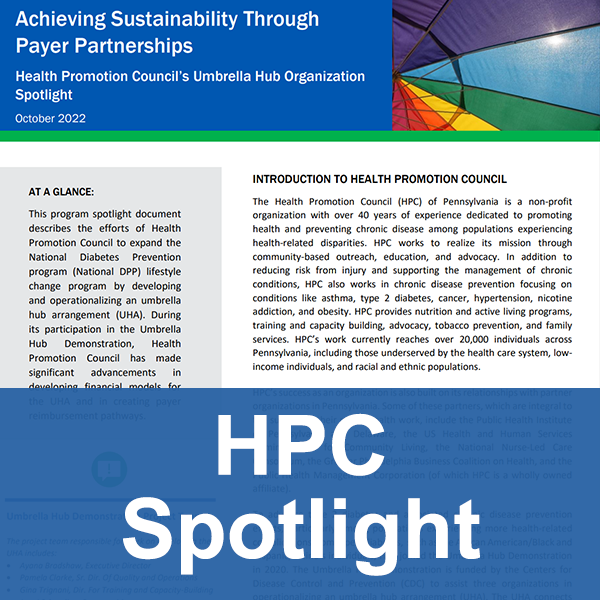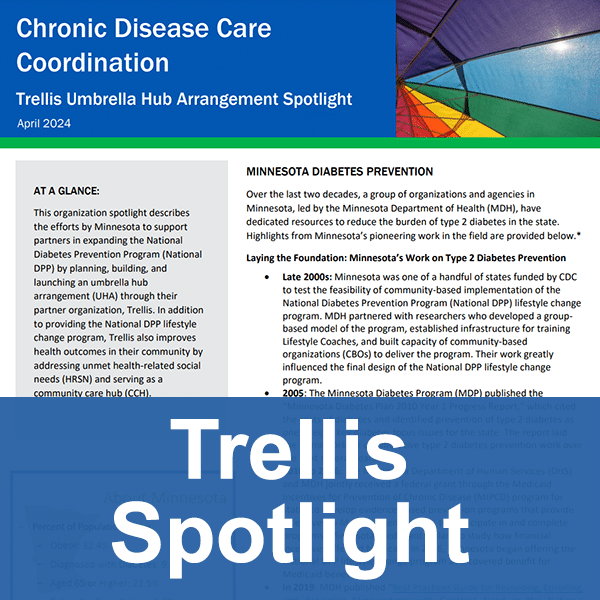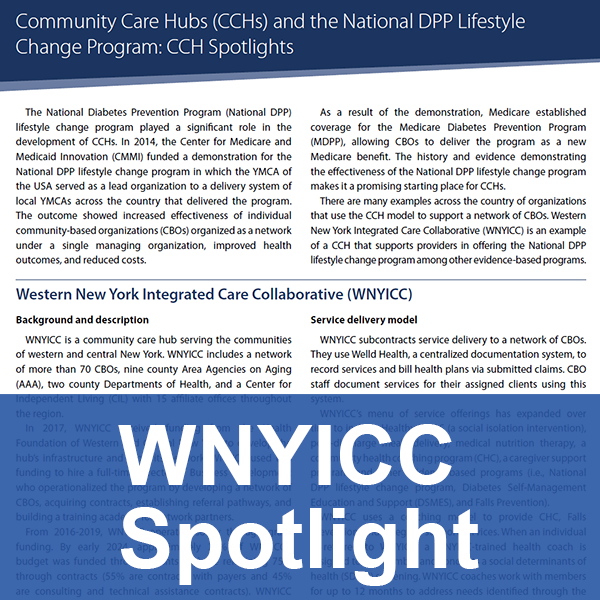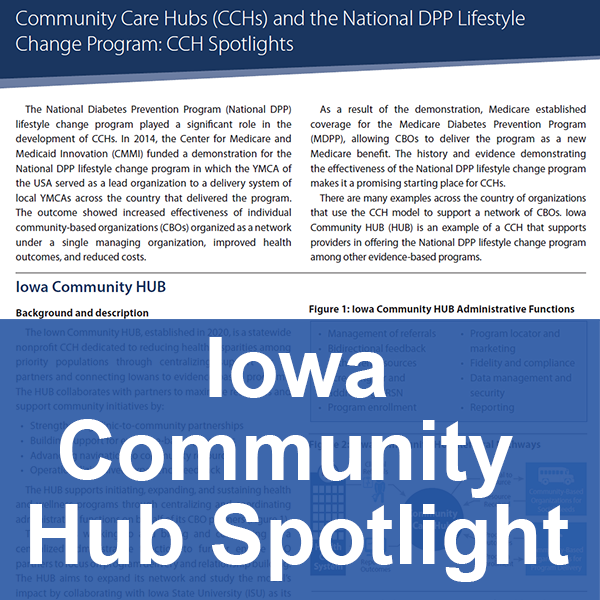Building Partnerships → Engaging CBOs
Engaging Community-Based Organizations
Community-based organizations (CBOs) can play a key role in scaling the National Diabetes Prevention Program (National DPP) lifestyle change program by integrating local insights and a deep understanding of community needs, resources, and dynamics with program delivery. Many states have found CBOs to be an integral part of their National DPP lifestyle change program delivery network. Throughout this page, CBO is used as a broad term for local organizations that could include Area Agencies on Aging (AAAs), YMCAs, tribal organizations, faith-based organizations, local charitable foundations, small social service agencies, and other small health care providers.
This page includes the following sections:
- Types of CBOs
- Why Engage CBOs
- Examples of CBOs Supporting the National DPP Lifestyle Change Program
- Reimbursement for CBOs
- Resources for Engaging CBOs
Types of CBO
There are various types of CBOs that could be effective partners in the effort to expand access to the National DPP lifestyle change program. Common CBO types are described below.
Area Agencies on Aging
Area Agencies on Aging (AAAs) are public or private nonprofit entities that work to address concerns of older individuals in a designated region. The U.S. population of older adults is expected to grow to 73 million by 2030, and AAAs are working to provide the home and community-based resources needed to support these individuals. AAAs serve an active aging population likely to include beneficiaries eligible for the Medicare Diabetes Prevention Program (MDPP) or the National DPP lifestyle change program, and they can provide location sites to host in-person MDPP or National DPP lifestyle change program sessions. AAAs are required to offer evidence-based programs to the populations they serve, and partnering with an MDPP supplier or CDC-recognized organization gives AAAs access to resources and trained Lifestyle Coaches. Additional information on AAAs can be found in the Shared Learning Resource, Partnership Development to Increase MDPP Referrals and Marketing.
YMCAs
YMCAs are nonprofit organizations that provide health and fitness programs for children and communities. YMCAs aim to improve the lives of the public by “connecting all people to their potential, purpose, and each other” through a variety of programs and activities that promote improving health and well-being. YMCAs have been involved at the state and national level since the inception of the National DPP lifestyle change program. Many YMCAs currently serve as key partners for state diabetes programs and deliver the National DPP lifestyle change program to the community.
Tribal Organizations
Tribal organizations that support American Indian and Alaska Native tribal populations have been engaged in translational research to adapt the National DPP lifestyle change program to suit the unique culture of their populations. CBOs supporting tribal populations could include Tribal Health Consortiums, Tribal Health Councils, and Tribal Associations. For a summary of how tribal organizations are involved in the National DPP lifestyle change program, see CDC’s American Indian and Alaska Native Communities page.
Faith-based Organizations
A faith-based organization, such as a church, can be influential partners in raising awareness of and offering programming for diabetes prevention and management. Faith leaders are often trusted source of information and can motivate congregants to make healthy choices. For more information on faith-based organizations, see CDC’s Faith Leaders Toolkit – Diabetes Management and Type 2 Diabetes Prevention.
Charitable Foundations
Charitable foundations with a specific condition or health focus, such as the National Kidney Foundation of Michigan, can offer programming such as the National DPP lifestyle change program to their populations of focus.
Networks of CBOs: Community Care Hubs and Umbrella Hub Arrangements
A community care hub (CCH) is an emerging model where a hub organization supports a network of CBOs that provide services to address health-related social needs (HRSNs). These hub organizations offer overarching structures that centralize administrative and reimbursement functions and provide a single point of contracting for health care providers and payers. The Western NY Integrated Care Collaborative, Iowa Community HUB, and Oregon Wellness Network are all examples of CCHs that coordinate a network of CBOs.
Umbrella hub arrangements (UHAs) have been created to serve a similar purpose that is specific to the National DPP lifestyle change program. UHAs connect CBOs with health care payment systems to pursue sustainable reimbursement for the National DPP lifestyle change program. Health Promotion Council of Pennsylvania and Trellis are two examples of UHAs. For more information on these and other UHAs, see the Umbrella Hub Arrangement Spotlights page of the Coverage Toolkit.
Why Engage CBOs
Many CBOs serve as trusted entities that are deeply embedded within local communities. With their unique understanding of the cultural, social, and economic dynamics of the communities they serve, CBOs can effectively tailor interventions, such as the National DPP lifestyle change program, to meet participant needs and preferences. CBOs also may have experience addressing the health-related social needs (HRSN) of community members, which could be beneficial when looking to scale the National DPP lifestyle change program.
CBOs have been an integral part of the expanded delivery of the National DPP lifestyle change program since the original translation of the clinical trial to community-based program delivery. In 2008, the DEPLOY study examined the feasibility of offering the Diabetes Prevention Program (DPP) clinical trial intervention in community settings, using a lower-cost, group-based model. The YMCA was the community partner in this early translation study. Trained YMCA wellness instructors facilitated the group sessions, and participants in this cohort successfully lost an average 6% of their body weight. Since this time, states have worked with YMCAs, state Alliances of YMCAs, and other CBOs to deliver the National DPP lifestyle change program.
As community-based health care models gain momentum with the support of national, state, and local initiatives, CBOs are well positioned to play a key role in delivering and sustaining the National DPP lifestyle change program. The following table outlines several federal health initiatives that have highlighted the significant role CBOs can play in addressing health and health disparities.
HHS Strategic Approach to Addressing SDOH
The November 2023 Department of Health and Human Services (HHS) Strategic Approach to Addressing Social Determinants of Health to Advance Health Equity publication, Community Care Hubs: A Promising Model for Health and Social Care Coordination, highlights the role CBOs can play in addressing social needs and improving health outcomes, including several National DPP lifestyle change program examples.
National Strategy on Hunger, Nutrition, and Health
The September 2022 Biden-Harris Administration National Strategy on Hunger, Nutrition, and Health affirms the importance of increased support for the prevention and management of diabetes, outlines several strategies that support diabetes prevention efforts, and encourages collaboration with CBOs.
Medicare Physician Fee Schedule
CMS’ 2024 Medicare Physician Fee Schedule provides an opportunity for CBOs to receive reimbursement for addressing HRSN. For additional information on Medicare Physician Fee Schedules and the National DPP lifestyle change program, please visit the Medicare section of the Coverage Toolkit.
CBO Partnership with Community Health Workers
As trusted entities in local communities, CBOs are more likely to employ community health workers (CHWs). CHWs possess intimate knowledge of the unique cultural, social, and economic dynamics of their communities. This knowledge can allow them to effectively connect with participants in the National DPP lifestyle change program and engage individuals who may be otherwise difficult to reach, particularly those who are disproportionately affected by diabetes. Harnessing the strengths of CBOs and the CHWs they employ can extend the reach of the National DPP lifestyle change program, enhance its impact, and foster and sustain health outcomes within local communities. For more information on CHWs, see the Utilizing Community Health Workers information on the Coverage Toolkit.
Examples of CBOs Supporting the National DPP Lifestyle Change Program
CBOs can engage with the National DPP lifestyle change program in a variety of ways. The below tabbed tables contain examples of CBOs delivering the National DPP lifestyle change program independently, through umbrella hub arrangements (UHAs), and through community care hubs (CCHs). For additional information on how CBOs can be part of a National DPP lifestyle change program network, visit the Building Network Capacity and Supporting CDC-Recognized Organizations page of the Coverage Toolkit.
Independent CBOs
The following examples are independent CBOs that are delivering the National DPP lifestyle change program. Several of these CBOs are partnered with NACDD’s Medicaid Beneficiary Enrollment Project (MBEP) state grantees.
Granite YMCA
Granite YMCA is a CDC-recognized organization and MDPP supplier that utilizes partnerships to strengthen their infrastructure and capacity to deliver the National DPP lifestyle change program and MDPP. Granite YMCA has many partnerships including with the Massachusetts College of Pharmacy, New Hampshire Department of Health and Human Services’ chronic disease unit, YMCA’s internal human resources team, and the YMCA board of trustees. Granite YMCA’s partnership with the Massachusetts College of Pharmacy is unique in that it provides pharmacy students with training on diabetes prevention and the lifestyle change program. Like Granite Health, other CBOs can use partnerships to increase engagement in and referrals to the National DPP lifestyle change program. Additional details on Granite YMCA’s partnerships can be found in the MDPP Shared Learning Resource, Partnership Development to Increase MDPP Referrals and Marketing.
National Kidney Foundation of Michigan
National Kidney Foundation of Michigan (NKFM) is one of Michigan Department of Health and Human Services’ (MDHHS) MBEP partners. As a chapter of the National Kidney Foundation, the organization seeks to eliminate preventable kidney disease, accelerate innovation to improve patient experiences, and dismantle structural inequities affecting individuals with kidney disease. NKFM has been a long-standing partner of MDHHS, supporting continued engagement of Medicaid managed care organizations (MCOs) in the state, participating in CDC’s 6|18 diabetes prevention initiative, and providing input into Michigan’s Medicaid benefit covering the National DPP lifestyle change program. NKFM delivers the National DPP lifestyle change program in metropolitan Detroit and offers both in-person and distance learning sessions. Additional information on NKFM’s program can be found here.
New Jersey YMCA State Alliance
New Jersey YMCA State Alliance is one of New Jersey Department of Health’s MBEP partners. The New Jersey YMCA State Alliance delivers the National DPP lifestyle change program in numerous YMCAs throughout the state (both in-person and distance learning) and collaborates with a variety of health care providers and CBOs to increase awareness of and participation in the program. Additional information on its program can be found here.
RIPIN
Since 2012, RIPIN, a coordinating body for CBOs delivering the National DPP lifestyle change program, has partnered with Rhode Island Department of Health to provide the infrastructure needed to operationalize the Community Health Network (CHN). The CHN is a centralized data management and referral system linking individuals to evidence-based health and wellness programs and classes for chronic disease management and prevention, including the National DPP lifestyle change program. Additional information on RIPIN and the CHN can be found here.
The Balm in Gilead
The Balm in Gilead is a faith-based organization that delivers the National DPP lifestyle change program in 52 local affiliate sites across seven states: Alabama, Florida, Georgia, Mississippi, North Carolina, South Carolina, and Virginia. It received funding for its Southeast Diabetes Faith Initiative through CDC’s 1705 grants to address health equity through building out National DPP infrastructure in underserved areas with a focus on priority populations including African Americans and older adult men. As part of this initiative, the Balm in Gilead created an all-male cohort, Healthy Men of Omega, which collectively achieved 7% weight loss. Information detailing recruitment and retention strategies for this unique cohort can be found in the MDPP Supplier Learning Series Scaling the MDPP with Populations of Focus resource. For additional information on the Balm in Gilead’s Southeast Diabetes Faith Initiative, please see the recording and slides from their presentation at the NACDD 1705 Virtual Showcase in June 2023.
The Sight Center of Northwest Pennsylvania
The Sight Center of Northwest Pennsylvania is a CDC-recognized organization and MDPP supplier that has utilized several unique methods for promoting the National DPP lifestyle change program and the MDPP. These methods include partnering with AAAs, elected officials, and senior living facilities. The Sight Center has also utilized cable access television and news publications to promote the MDPP to potential participants. Additional information on the Sight Center can be found in the MDPP Shared Learning Resource, Partnership Development to Increase MDPP Referrals and Marketing.
YMCA of Greater Seattle
YMCA of Greater Seattle is one of Washington State Health Care Authority’s (WA HCA) MBEP partners. WA HCA began engaging with YMCA of Greater Seattle as part of their partnership with Washington State Alliance of YMCAs. The YMCA of Greater Seattle acts as the fiscal and contractual sponsor of the Washington State Alliance of YMCAs and leads the Alliance in delivering the National DPP lifestyle change program to Medicaid beneficiaries in partnership with other YMCAs in the state. They also connect individuals to other beneficial health programming at their local YMCA facilities by including a 6-month complimentary membership to their local YMCA facility during the first half of their year-long participation in the National DPP lifestyle change program. YMCA of Greater Seattle offers both in-person and distance learning sessions of the National DPP lifestyle change program. Additional information on its program can be found here.
YMCA of Metropolitan Milwaukee
YMCA of Metropolitan Milwaukee (Y-MKE) is one of Wisconsin Department of Health Services’ (WI DHS) MBEP partners. WI DHS chose to collaborate with Y-MKE because of the value it brings as a CBO well-positioned to implement innovative approaches to reach populations most at risk for diabetes. Y-MKE’s impact in Milwaukee is widespread, and they have been able to reach individuals that otherwise may not have participated in National DPP lifestyle change program. Y-MKE’s belief is that lasting personal and social change happens in the places where their members live, work, and play—placing them squarely in communities with populations at greatest risk for diabetes. Y-MKE offers both in-person and distance learning sessions of the National DPP lifestyle change program. Additional information on its program can be found here.
UHAs Containing CBOs
CBOs are commonly included as subsidiary organizations in UHAs. The following examples outline UHAs that include CBOs delivering the National DPP lifestyle change program.
Health Promotion Council (HPC) of Pennsylvania
HPC is a nonprofit organization dedicated to promoting health and preventing chronic disease among populations experiencing health-related disparities. As part of the Umbrella Hub Demonstration, HPC began serving as an umbrella hub organization (UHO) supporting CBOs, also known as subsidiary organizations, delivering the National DPP lifestyle change program. HPC’s subsidiary organizations include health care providers, government agencies, local nonprofit organizations, pharmacies, and private employers. HPC supports these subsidiary organizations by taking on the following roles:
- Recruiting payers and subsidiary organizations
- Reviewing subsidiary organizations’ data for accuracy and quality
- Coaching subsidiary organizations on quality improvement measures
- Contracting with payers, subsidiary organizations, and a billing vendor
- Maintaining Diabetes Prevention Recognition Program (DPRP) status
- Maintaining Medicaid and Medicare provider status
Through the administrative support HPC provides to subsidiary organizations, those organizations can focus primarily on the delivery of the National DPP lifestyle change program. Additional information on HPC and its subsidiary organizations can be found in the HPC Spotlight.
Trellis
Trellis, a nonprofit and AAA, serves as a UHO supporting organizations delivering the National DPP lifestyle change program. Trellis does this in the context of its mission to assist individuals to age well and develop the capacity of communities to care for an aging population. Trellis had eight subsidiary organizations delivering the National DPP lifestyle change program, including several CBOs. Trellis supports subsidiary organizations through offering the following technical assistance:
- Holding monthly check-ins to provide updated resources and solutions to potential barriers
- Training staff on data and claims submission platforms
- Educating staff on National DPP lifestyle change program eligibility criteria, Diabetes Prevention Recognition Program (DPRP), and Medicare Diabetes Prevention Program (MDPP) requirements and ensuring all are met
- Providing information on available tools, resources, and best practices related to the National DPP lifestyle change program
- Assisting with marketing the National DPP lifestyle change program to priority populations
- Training Lifestyle Coaches on how to assess readiness to change
The technical assistance provided by Trellis allows subsidiary organizations to focus on the delivery of the National DPP lifestyle change program itself, rather than administrative requirements. Additional information on Trellis and its subsidiary organizations can be found in the Trellis Spotlight.
CBOs in Community Care Hubs
A CCH is an entity that organizes and supports a network of CBOs providing services to address HRSN. The following examples are CCHs delivering the National DPP lifestyle change program.
Western NY Integrated Care Collaborative
Western NY Integrated Care Collaborative (WNYICC) is a CCH made up of local CBOs providing social care programs and services including the National DPP lifestyle change program. WNYICC centralizes operations of participating CBOs to address HRSN, close gaps in care, and improve patient compliance with health care provider recommendations. Its partners include more than 65 CBOs, eight AAAs, and a Center for Independent Living. A full list of WNYICC network members can be viewed here. For more information, see the WNYICC Spotlight.
Iowa Community HUB
Iowa Community HUB is a CCH focused on preventing and managing chronic disease in Iowa by ensuring access to community health promotion programs such as the National DPP lifestyle change program. Iowa Community HUB provides administrative and capacity-building support to over 75 community partners that include health systems, employers, and a variety of CBOs. A full list of Iowa Community HUB’s chronic disease prevention partners can be viewed here. For more information, see the Iowa Community Hub Spotlight.
Oregon Wellness Network
Oregon Wellness Network (OWN) is a division of the Oregon Association of Area Agencies on Aging and Disabilities (O4AD) that serves as a CCH for 16 AAAs and 18 other CBOs. A full list of OWN’s partners can be viewed here. OWN leads the network in delivering evidence-based health education programs and interventions, including the National DPP lifestyle change program and the MDPP. OWN’s website provides resources for those interested in the National DPP lifestyle change program, including frequently asked questions and a risk assessment quiz. OWN’s vision is to help communities across Oregon create a culture of health and wellbeing, where prevention and wellness are the norm. Their mission is accomplished through leveraging partnerships that have been created across the state of Oregon to help provide services to older adults and individuals living with disabilities. OWN has operated as a CCH since 2017, contracting with different payers and vendors to provide marketing, referral assistance, web development, and revenue cycle management to its partners. They are currently working on becoming a CDC-recognized UHO. Additional information on OWN can be found in the MDPP Shared Learning Resource, Spotlight on the Oregon Wellness Network: Partnership Development.
Reimbursement for CBOs
Since CBOs can deliver the National DPP lifestyle change program or MDPP independently or through a UHA or CCH, CBOs have several options for reimbursement. Methods of reimbursement vary based on how the program is delivered. Reimbursement for CBOs is available through the following mechanisms:
- Medicare currently reimburses CBOs that are delivering the Medicare Diabetes Prevention Program (MDPP). To learn more about enrolling as an MDPP supplier, see the MDPP Basics page of the Coverage Toolkit.
- Medicare Advantage (MA) Plans must either contract with enrolled MDPP suppliers, cover out-of-network services, or enroll in Medicare as an MDPP supplier to provide the program to their enrollees. For additional information on MA plans, see the Medicare Diabetes Prevention Program: A Practical Guide for Medicare Advantage Plans resource and the MDPP Implementation page of the Coverage Toolkit.
- Medicaid reimburses CDC-recognized organizations delivering the National DPP lifestyle change program in states where Medicaid coverage for the program is established. For additional information on Medicaid reimbursement available for CDC-recognized organizations, please visit the Reimbursement Models for Medicaid Agencies page of the Coverage Toolkit. To see which states have Medicaid coverage for the National DPP lifesytle change program, visit the Medicaid Coverage Landscape: Map and Visualizations page of the Coverage Toolkit.
- Medicaid Managed Care Organizations (MCOs) can be a source of reimbursement for CBOs through direct contracting or through contracts with third party organizations. While many MCOs may choose direct contracting with CDC-recognized organizations, some may opt to contract with a third-party organization to administer the National DPP lifestyle change program. Third-party organizations, including UHAs or CCHs, can work with MCOs to establish a network of CDC-recognized organizations, coordinate referrals from health care providers, and recruit eligible individuals into the program. Resources and additional information related to contracting with MCOs are available on the MCO Contracting page of the Coverage Toolkit.
- Employers can choose to provide coverage for the National DPP lifestyle change program as part of their benefit offerings. CBOs may consider contracting directly with local employers to provide the program to employees and their eligible dependents. To learn more about employers covering the program, see the Employer Coverage Landscape page of the Coverage Toolkit.
- Commercial Payers can contract with CDC-recognized organizations, including CBOs, to provide the National DPP lifestyle change program to their members. For information on common elements recommended for inclusion in such contracts, see the Commercial Contracting page of the Coverage Toolkit.
- Grant Funding can provide CBOs with funding to support the development and evaluation of type 2 diabetes prevention and control initiatives, such as the National DPP lifestyle change program. Information about current and past grant funding opportunities, including CDC Cooperative Agreement Investments, can be found on the Additional Initiatives page of the Coverage Toolkit.
CBOs can find state Medicaid agencies, commercial payers, and employers that are covering the National DPP lifestyle change program on the Who Covers the National DPP Lifestyle Change Program? page of the Coverage Toolkit.
Resources for Engaging CBOs
CDC has developed several resources to assist CBOs in learning about and delivering the National DPP lifestyle change program. States may consider directing CBOs to these resources in the early stages of engagement around the National DPP lifestyle change program. These resources include:
- Becoming a Lifestyle Change Program Provider
- Requirements for CDC Recognition
- Faith Leaders Toolkit – Diabetes Management and Type 2 Diabetes Prevention
- CBO Capacity Assessment
CBOs may also reference the Partnership Assessment Tool for Health (PATH) for recommendations on maximizing the impact of their partnerships. This tool was developed by Partnership for Healthy Outcomes, which is a collaboration of Nonprofit Finance Fund, Center for Health Care Strategies, and Alliance for Strong Families and Communities.


